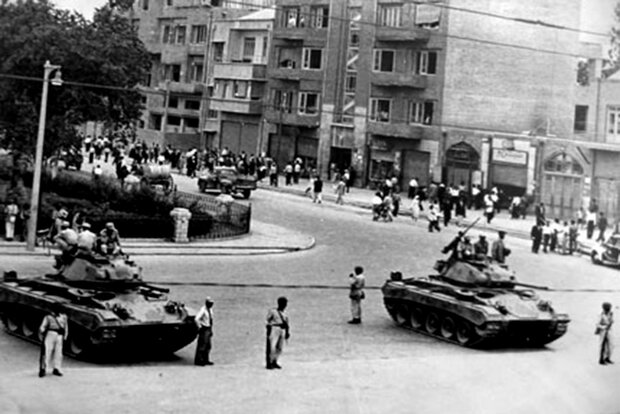The 1953 coup in Iran was organized to fulfill the British and American goals

Mehr News, International Group – English service: August 28 coup 1332, with the financial support of the United States and England, Mohammad Mossadegh removed the legitimate prime minister of Iran from power and returned Mohammad Reza Shah Pahlavi to power as the king. During the conflicts caused by the American and British coups, about 300 people died in Tehran.
Due to its strategic location and huge oil reserves, Iran has always been of special interest to America, England and other world powers throughout history. Britain was present in Iran during World War II to protect one of its energy supply routes and to prevent oil from falling into German hands. After the war, England effectively maintained control over Iranian oil through the establishment of the Anglo-Iranian Oil Company.
But this situation did not last for England and suddenly changed in 1951 when the Iranian parliament led by the democratically elected government of Mossadegh voted to nationalize the country’s oil industry. . Britain, seeing its interests at risk, started a secret campaign to weaken and destabilize Mossadegh.
First, the British government tried to convince the Shah to remove Mossadegh by engineering a parliamentary decree, a ploy that both failed and damaged Mossadegh’s credibility. It increased and decreased the prestige of the king. When pressure to oust Mossadegh turned to the idea of a coup to topple the government, Britain, unwilling to shoulder the responsibility alone, persuaded the United States to join London.
On the occasion of the 28th August coup anniversary, a conversation was held with Dr. “David Yagoubian”, professor of history at San Bernardino State University of California in America. It is explained below:
What were the objectives behind the coup organized by America and Britain?
The 1953 coup in Iran was organized to fulfill the goal of Britain and the United States to simultaneously suppress the oil nationalization movement and replace Iran’s democratically elected government with the dictatorship of the puppet Pahlavi regime. It enabled a consortium of western companies to subsequently control Iran’s oil and Mohammadreza Pahlavi to remain on the throne against the will of the Iranian people and to their collective detriment to secure foreign interests. Although the goal of the 1953 coup was not to plant the seeds of revolution in Iran, this was ultimately its primary achievement.
Why was the nationalization of Iran’s oil industry so important to those who claim democracy that they could not have a democratic government? tolerate Iran’s time?
The nationalization of AIOC in 1951 as the largest source of British-controlled crude oil was intolerable for the dying British Empire, which had first He resorted to a global embargo on Iran’s oil, before he convinced the Americans to cooperate in the coup by appealing to the conditions of the Cold War. The Eisenhower administration’s parallel concerns about potential Soviet interests made the US government of the time inclined to exercise control over Iranian oil, and this was evident during the equal sharing of the spoils by the US and Britain through the 1954 Consortium. Dividing Iran’s oil wealth among this consortium of foreign companies was never an acceptable proposition for Iran’s democratically elected leadership, so the coup was designed to install a low-profile and submissive government in Iran to serve British and American interests.
How has the coup organized by the United States affected relations between the two countries since then?
The coup of 1953, which was organized by the United States, was in fact the seed of modern Iranian-American relations. The coup and the subsequent US abuses of the Pahlavi dictatorship (such as the SAVAK horrors) exposed the true face of the US government to the Iranian people, who wanted to oust the American king, the US military advisers and contractors employed by the Pahlavi regime. Tens of thousands of people revolted. The success and durability of the 1357 Iranian revolution has driven the American imperialists crazy. Nearly half a century of unsuccessful attempts by the US to bully, bully, provoke, humiliate, isolate the world and even starve the Iranian people (according to former US Secretary of State Mike Pompeo) since the revolution have only led to the isolation of the US itself. and has increased the speed of the collapse of America. After the 1357 revolution, America even tried to contain the revolution by supporting the Baath Party of Iraq and the Iran war, but it failed again, and it is the Islamic Republic and its allies who have effectively controlled the American empire in the region.
Do you see a change in America’s colonial policies after decades? Have these colonial policies stopped, or have their methods of application simply changed?
Instead of changing colonial policies or using different methods, I witnessed the disgraceful failure, and self-defeating folly of America on a larger scale, with an unwarranted effort to double down. Making failed policies has its past. Until American imperialists can grasp the fact that the United States will never achieve global hegemony and “total domination,” and that their efforts to promote such unipolar US supremacy will backfire, the United States’ policies He will continue to make mistakes and pursue short-term goals in the interests of the US military-industrial complex, policies that will accelerate the long-term destruction of US power, legitimacy and relationships. Consider US policies. Such as the criminal occupation of Iraq, Syria and Afghanistan, the massacres in Yemen and Libya, as well as the ongoing attempt to destroy the Palestinian community in a completely genocidal project by the United States, it is clear that murder, destruction and chaos continue to characterize the foreign policy of the United States. United is in West Asia.
While the American political power claims that their policies in the region have been successful, the position of the United States throughout the region, physically and diplomatically, day by day. It becomes weaker and more dangerous. Its global credibility and legitimacy is at its lowest historical level, and the US does nothing else in the region apart from creating tension, conflict, war and genocide.



